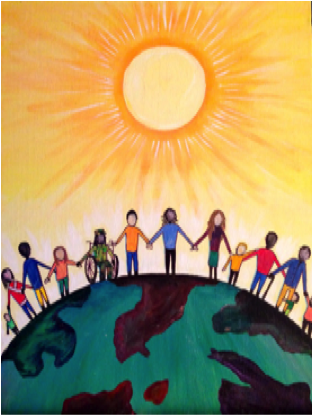Elaine Miller-Karas' Featured Article on Psychotherapy Networker
Since February 25, 2022, the Trauma Resource Institute (TRI) has been providing ongoing support to Ukrainians through free, virtual webinars on the Community Resiliency Model (CRM)®. In this article for Psychotherapy Networker, Elaine Miller-Karas, the co-founder of TRI, reflects on and writes about the experience of providing humanitarian assistance to Ukraine during this time. A snippet of the article, “Reflections from a Therapist Treating Ukrainian Survivors” is below.
“Reflections from a Therapist Treating Ukrainian Survivors,” by Elaine Miller-Karas
On March 1, 2022, an anguished voice begins, “My name is Marianna. My house is destroyed. My office is being shelled. I have barely escaped with my life.” She’s shakily accessing a video call from her location in Ukraine, but her image doesn’t appear on the screen, only her voice can be heard. “I will never be the same again,” she says to the Ukrainian and international teachers, parents, grandparents, community members, and trauma specialists on the screen. “I will never experience happiness or laughter again.”
As we listen, Marianna tells us how alone she feels in her despair. “I am with my family, but cannot share my feelings,” she explains.
“We can be here for you in this moment,” I tell her. “Can you sense that you are not alone now?”
She pauses, then tells us more about the trauma she’s living through. “I’m alive now, but tomorrow they could kill me.” She speaks about the depersonalization of war and the surreal way that she’s detaching from the horror surrounding her so that she can get through each minute. Her voice rises, full of grief. “I’ve never done anything to the Russian people!” she insists.
I begin to talk to her and the others on the call about moral injury and how difficult it is when our values about how to treat others are violated in war. Then I invite Marianna to use a community resilience, strength-based skill of bringing awareness to her internal and external sources of support and strength. She goes quiet, and after a moment, says, “I am crying now. The group is helping.”
“We are embracing you,” I assure her. The others on the call nod compassionately. I ask her if she can sense and hold compassion for herself and for others at this moment. "Yes," she murmurs.
“Now that I can feel my tears, I’m thankful for them. It means I’m alive. But I’m actually ready to die for my country,” she tells us, with surprise in her voice. “It’s the most honorable thing a person can do.”
The other Ukrainians on the call begin to speak up with poignant statements of encouragement. They affirm her courage, her wisdom for sharing her anguish, her tears, and her happiness for tears.
The call is nearly over and Marianna closes by saying, “This is a safe space. I thank you.”

